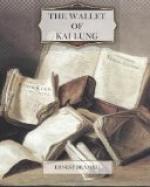“Well said the wise and deep-thinking Ye-te, in his book entitled Proverbs of Everyday Happenings, ’Should a person on returning from the city discover his house to be in flames, let him examine well the change which he has received from the chair-carrier before it is too late; for evil never travels alone.’ Scarcely had the unfortunate Quen recovered his natural attributes from the effect of the disgraceful occurrence which has been recorded (which, indeed, furnished the matter of a song and many unpresentable jests among the low-class persons of the city), than the magnanimous Empress reached that detail of the tree-planting ceremony when it was requisite that she should deposit the living emblems of the desired increase and prosperity upon the leaves. Stretching forth her delicately-proportioned hand to Quen for this purpose, she received from the still greatly confused person in question the Imperial silkworms in so unseemly a condition that her eyes had scarcely rested upon them before she was seized with the rigid sickness, and in that state fell to the ground. At this new and entirely unforeseen calamity a very disagreeable certainty of approaching evil began to take possession of all those who stood around, many crying aloud that every omen of good was wanting, and declaring that unless something of a markedly propitiatory nature was quickly accomplished, the agriculture of the entire Empire would cease to flourish, and the various departments of the commerce in silk would undoubtedly be thrown into a state of most inextricable confusion. Indeed, in spite of all things designed to have a contrary effect, the matter came about in the way predicted, for the Hoang-Ho seven times overcame its restraining barriers, and poured its waters over the surrounding country, thereby gaining for the first time its well-deserved title of ‘The Sorrow of China,’ by which dishonourable but exceedingly appropriate designation it is known to this day.




